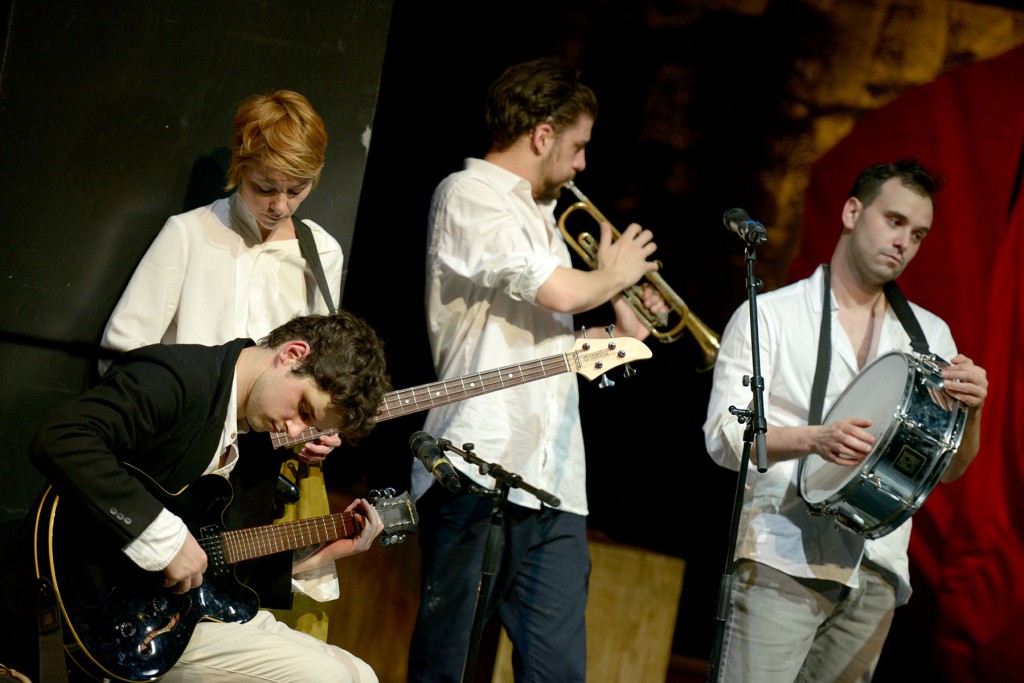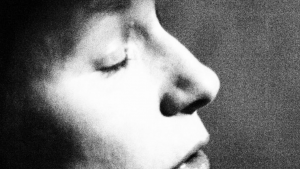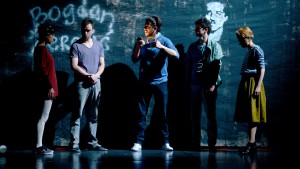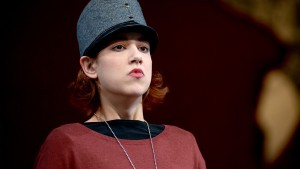A SORROW THAT WEIGHS A TON
Interview with Iva Milošević, director of ‘The Dragonslayers’

J.K.: A hundred years have passed since Princip’s assassination of the Archduke Ferdinand. What was crucial in your decision to stage Milena’s play The Dragonslayers, addressing the Young Bosnians and Gavrilo Princip?
I.M.: The crucial thing about this play is that it glorifies freedom-loving spirit. Milena starts from the assumption that her heroes were fighters for freedom who sacrificed themselves in a profound and sincere faith for the wellbeing of others. From today’s safe distance, one can think of the Sarajevo Assassination in many different ways, but ultimately it boils down to the fact that it was an act of revolt against oppression, injustice, occupation. And how do we view revolt nowadays? Not in public, but deep inside? This is the question raised by this show. So, the already worn out sentence, ‘fallen for freedom’, this is really true in this case. How do we view this today? Is it possible, from the perspective of today’s world and the spirit of these times, to speak about the freedom-loving spirit as an ideal not only contained in myths? When I started to think about this play, I remembered loving the song ‘Freedom’ by the band Azra. At that age, the chorus of the song meant a lot to me. It says: “Freedom is a woman. Take it”. What a simple and accurate definition. Freedom is not complicated. It is a matter of instinct, courage, desire, daring. Freedom is a challenge, a risk, but also a matter of self-recognition, self-validation. Cioran would say: “a war not only against the world, but also against one’s own fatigue of the world.” The production deals with contemporary relations, questioning what heroism would be nowadays, it deals with desire, fervour, anti-bourgeois and non-conformist meaning — the freedom-loving spirit, and all that through poetry. And, as Mirko Kovac puts it, “poetry is an illusion, and an illusion is not to be interpreted, but chased before the images take form.”
J.K.: The Dragonslayers is not a historical play. Where do you perceive its truth to be?
I.M.: The truth of this play is in the question of where the spirit of freedom is today. What happened to it? Is the spirit of freedom endangered nowadays? Murder is not its subject, it’s merely a dramatic circumstance, a historical fact. But the disgust, the sons’ rebellion against the fathers, what Peter Sloterdijk deals with in his book Rage and Time, this feeling of profound radical essential injustice of the world — these were the subjects we addressed.
J.K.: Characters in The Dragonslayers are not fixed. As far as the cast is concerned, how different is this rehearsal process from the usual studying of the script?
I.M.: It’s very different. A lot of talks, exercises, improvisation, sideline inspiration.
J.K.: Your work so far proves that you readily and gladly decide to stage your contemporaries. Do you collaborate with Milena?
I.M.: We respect the playtext. We respect the dramatic structure. I talk to Milena, but she does not sit in rehearsals.
J.K.: You like to work with ‘your team’. But this time it could be said that you work with the young forces of Yugoslav Drama Theatre. What qualities did your work gain with it?
I.M.: Sadness of a young person is the saddest. On stage, their emotions are exciting in a special sort of way because they are raw, devoid of layers of experience, thinking things out, analysis, self-irony. Discontent with the world, anger at what keeps missing is an intense feeling, a simple one. And it weighs a ton.
7 June 2014, Beograd, Jugoslovensko dramsko pozorište, 2014.
Go back to: Dramaturgical Materials of “The Dragonslayers”
Published on 30 November 2015


